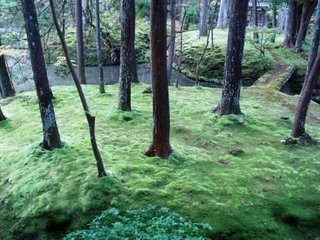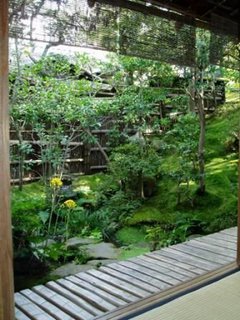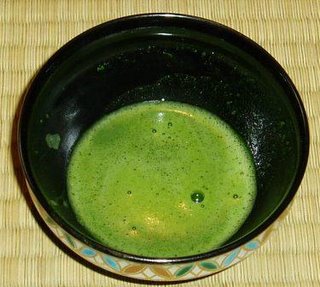Words are marvelous because they can work as a useful tool to explore possibilities to share with others with different views from yours.
4/22/2007
Easier Solution
3/15/2007
Stookey Songs for the Abuductee
Related article: No Justice
3/08/2007
NO COMFORT?
I was disappointed to read them because the writers seem to have written them before seeing the issue in perspective.
According to me, Japan will appologize and accept the call (though it apoligized more than once) if it is based on fair judgment and investigation into the truth, in correct judicial proceedings. But I don't think it is fair to charge a suspected person with the alleged atrocity its accusers describe.
More important, it doesn't matter if the Korean's explanation is true or not. What matters most should be found in "Agreement on the Settlement of Problem concerning Property and Claims and the Economic Cooperation between the Japan and Republic of Korea."
South Korea, in normalizing relationship with Japan after the World War II, stated that it would take care of all of the Korean individuals who were victimized by the Japan Army, taking 300 million dollars and more from Japan, as the compensation. Sadly, the Korean government spent all the money for developing the country, without gaining permission from the nation.
2/14/2007
No Police
What they are saying is Japan needs to have nuclear weapons to claim the abductees should be returned to their home country. And I will tell China and South Korea that they haven't been qualified to blame Japan for what it did because they have allowed North Korea to do the same evil things as the alleged atrocities Japan did against them during the first half of the 20th century. Evil is evil. In their countries, can they tell their children the resolution can be called fair?
North Korea, I'm adamant, must be a regular rogue toward civilians. The world has no police to arrest villains. The US may have failed in Iraq but should not have learned how he made the mistake. In both cases, no justification in cutting deals has been made. North Korea is one of those countries like Russia, as described in "Potemkin Justice"(Washingtonpost), though it's much poor in power and quality.
P.S. A Good Deal with North Korea (Boston Blobe), Nuclear Bargaining and U.S. Flexibility Credited in Nuclear Deal With N. Korea (Washingtonpost), Pact With North Korea Draws Fire From a Wide Range of Critics in U.S. (New York Times).
11/05/2006
Against Russia
10/18/2006
What is a Faulknerian?
8/15/2006
To the World
Japan seems to have been charged with its alleged attempts to whitewash the atrocities it committed during the wars in the first half of the 20th century. Some have found three symptoms of its kind in 1) some of the descriptions in the Japanese history textbooks, 2) the Japanese insistence on its own dominion over Takeshima (alleged by Korea), and 3) the present Japanese Prime Minister’s frequent visits to Yasukuni Shrine. However, I wonder how these can be regarded as the symptoms because I observe they are just indicative of Japan’s repentance and responsibility for what it did in the wars, and its results. In another expression, Japan has a firm determination not to appeal to arms to resolve international conflicts with any other countries. So, I don’t understand how those interpretations can go so far. Let me try to rectify the misunderstandings.
1) As to the Descriptions in textbooks
Again, one of the biggest lessons the wars gave Japan was you should not appeal to arms to handle international affairs because a war is just a competition in arm, so it cannot work as a way to judge what is right over a matter in question. This must have been an axiom to Japan, but our (great-) grandfathers were driven to the wars. Why? Japan thinks it necessary to study more about the international wars in the first half of the previous century, to trace how he forced himself to participate in the wars, the Shino-Japanese war and the Pacific War, whose whole picture, according to researchers, has remained incomplete. Some attribute its decisive cause to the Japanese being extremely evil. But Japan thinks it is just a layman’s answer. A factual survey of Japan’s actions during the wars shows he did so many things, some of which should be categorized as bitter wrongdoings and others should not. Some persons think the latter actions should not be described in the textbooks, but Japan wants to get a whole picture of the wars to trace the true cause(s) of the biggest tragedy that the world had ever had, so those descriptions need to be in the textbooks, in order to let the students see the wars in perspective.
2) Takeshima (Dokto)
Which country has the authorized dominion over Takeshima (Dokto)? This has been difficult to settle because there has been no clear logic in showing who the true owner of the island has been. In the beginning, what can give the authority to either of them? Is it factual records or documents? They cannot because they are just pieces of information, so they cannot give an unerring answer to the problem, so that each of the two countries is allowed to cling to his own assertion while ignoring the opponent’s statement. What should they do then? One of the most possible solutions might be to ask the International Court of Justice for help. Japan suggested doing so, but Korea has refused to agree. I don’t know why.
What I want to let Korea know most is that Korea is doing the same thing as Japan did against Korea before. Korea has put its army in Takeshima to prevent any Japanese civilian fishermen from approaching to the island. In short, Korea has appealed to arms to handle international affairs. I suggest Korea should leave the Takeshima matter to the International Court of Justice. Let me tell you Japan is not going to handle this matter with weapon.
3) Yasukuni Shrine
I would say this is a matter of intercultural conflict. So, I think Japan needs to describe and delineate how Shinto, a Japanese idiosyncratic religion, lets Japanese pay homage at the shrine. Those who have criticized the Japanese Prime Minister’s frequent visits to Yasukuni Shrine, I’m saying, do not know what the visits mean. Do you know Shinto has no doctrine to cling to and its reason? There are so many religions in the world, but they look the same in that they may help us understand or accept a fact complicated, unfathomable, and susceptible to several readings, like why we are mortal, why my baby was gone at his or her birth, why I have had no leg since I was born, why a person whom I thought honest and sincere kills another person, etc. You can say that the kind of fact should be a phenomenon in which two or more opposite interpretations can go. On the contrary, the religions are different from each other in their ways to help or let persons understand or accept those facts. I’m saying some who criticize the visits are ignorant of the way adopted in Shinto.
An event becomes a problem to you when the event collides with the one you have had. Can you guess what Shinto requires you to do then? It advises you to let those incompatible things coexist peacefully and tranquilly. In Shinto, “praying” is correspondent in meaning with not “admiring or worshipping someone” but “contemplating the kind of situation in which there are two or more things that are inconsistent with each other.” More important, the wars were an amalgam of so many phases: Japan competed with and was lost to US in the Pacific War while Japan invaded China in the Shino-Japan War like the Powers did in the world then, and the Japanese leaders committed awful mistakes in adopting strategies and made so many Japanese soldiers die in vain though they did not intend (they were not wise enough). To Japanese, those were mingled indistinctively in the wars. You should not see just one element, or you would not be able to see the wars in wider perspective. I would say that the Japanese Prime Minister praying at Yasukuni Shrine indicates an attempt to let the whole disastrous wars remain in the Japanese minds, including Japan’s remorsefulness over having made so many mistakes and their results, distress and anguish, and his grief and lamentation for those who were forced to live and survive in the Dark Age.
NY Times(August 14, 1945)
Townhall (August 20, 2006)
7/27/2006
Chi
Did you hear about CHI, seen in Dragon Ball Z, a Japanese animation? It is something mysterious, a kind of supernatural power. I didn't believe its existence until I found myself emitting it.
A couple of months ago, I found my feet paralyzed when I was getting into computer, so I thought I should have got a serious problem in my brain or backbone. Additionally, I realized I was losing weight, no less than 5 kilos. I said to myself, "It may be a cancer somewhere in my body."
I tried not to depress myself with that guess because a couple of decades in my life told me my feelings would affect my sickness. I told myself to be positive and relaxed to take away any bad disease from me.
Then I realized my hands were wrapped in something warm and it was so abundant that I thought I could throw it away. I threw it to my sister, she said something was felt in or on her forehead.
I had seen a middle-aged woman, one of my colleagues, using chi to heal middle-aged persons. Then, I thought she was trying to deceive us, though I heard one of them say, "my pain in my head has gone." Anyway, I recalled how she used chi and began to use it.
I have used it for about 80 persons; some are fine and others have headache and stiff shoulders; more than 90 percent of the persons felt something emitted through my hand. 95 percent of the persons with either headache or stiff shoulders said the diseases were gone.
I want to know what is emitted through my hand or what has been called chi. Let me know if you know.
4/21/2006
Moss Temple
Well, if you visit Saiho-ji, you're required to reserve a couple of months before visiting Saiho-ji. And there you're permitted to see the sights in the garden after making a handwritten copy of one passage in a Buddhistic scripture to give you calmness because it is thought concentrating into writing in a ritual or formal way would offer you a feeling of calmness and detachment.
I would recommend you to come to Saiho-ji in November because you will be able to enjoy the contrast of Moss Green with Red Leaves. When I was there, I found I had not seen such a beautiful place. I was driven to keep taking photos of the sights, but I also found my photo skill was not enough and I thought I would buy another camera better in quality enough to enable me to take better ones. Next time I go there, I will take a new camera with me.
3/29/2006
Beautiful Foolishness of Things
Can you guess what it means? Anyway, that remark reminded me of the conversation between Smith and Neo in the culminating part of The Matrix: Revolution. Smith saw Neo being beaten but trying to fight, and said, "Why, Mr.Anderson? Why, why, why? Why do you do it? Why, why get up? Why keep fighting? Do you believe you're fighting for something? For more than your survival?"
You may more easily understand the meaning of Okakura's remark if you replace "fighting" with "surviving." This is one of the most difficult questions human beings have ever had. Smith continues to ask,
Can you tell me what it is? Do you even know? Is it freedom or truth? Perhaps peace? Could it be for love? Illusions, Mr. Anderson. Vagaries of perception. Temporary constructs of a feeble human intellect trying desperately to jusitify an existence that is without meaning or purpose! And all of them as artificial as the Matrix itself although only a human mind could invent something as insipid as love. You must be able to see it, Mr. Anderson. You must know it by now. You can't win. It's pointess to keep fighting. Why Mr. Anderson? Why do you persist?
I agree with Smith choosing the word "persist" because I don't know why I try to survive. What answer can you give Smith and me? Few persons know exactly where they are in a etaphysical sense, but some of you can persist in stating "Because I choose to (survive)" like Neo answers there.
Well, what do you think many of you would do in this kind of uncertainty? I think many of them have to try to find what is secure in this world on which to establiish their own lives, so what matters most to them should be whether they can be satisfied or not.
They are mortal and temporal, so you will be nothing as things will be, but so long as you live you want to do something that will satisfy you. In this sense, you are foolish, but don't you think they may look beautiful in cherishing their tiny limited lives? At least, some Japanese think so. This philosophy lies behind Japanese culture, according to Okakura Tenshin.
In Faulknerian expression, "between nothing and grief, I will take grief."
2/28/2006
Siva's View 4: Buddhism
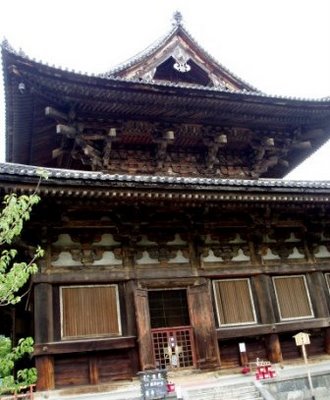
Buddhism has been regarded as one of the major religions in Japan, but I don't think it has played the same roles as Christianity in the West and Islamism in the Middle East.
It was thought to flow into Japan through Korea in the midst of the 6th century, but it didn't have a definite form or doctrine to cling to, so the people were just attracted by magnificence of Buddhistic statues, which made them believe it had a supernatural power to ask for help.
More important, such splendidness, as you might call ostensiveness, was utilized to unite the small communities into Japan in the 7th century. Therefore, so many huge temples and statues were built in the Nara and Heian periods (710-about 1200).
One of the big examples is in the photo. The building is named "Daikodo" in "Todai-ji" in Kyoto. Can you see the small door in the big door? The small one is for persons. The big one is for the 12 huge statues who live inside. I hope you will have a chance to appreciate each of them.
Go to What is Buddhahood?
1/27/2006
Siva's View 3: the Birth of Japan
Before that, the island that would be Japan was like the USA in the first half of the seventeenth century. I mean the immigrants came there from different countries and regions, including South Asia and Polynesia. Of course, before they came there, some peoples must have been there, like Eskimos.
From the 4th or 5th century, a powerful people from the Korean peninsula moved to Japan, who tried to survive on tree in Japan because they need them to make iron. Some researchers say that they were so aggressive that they were described as a big snake with eight heads in a myth. Anyway, those Koreans were one of the major peoples in ancient Japan.
As to the dawn of Japan, one of the biggest mysteries was why so many small communities in ancient Japan were integrated into one country without any conflicts. As shown above, there were several peoples, each of them had a community, so it seemed to be difficult for them to have a whole country without any competition, but they did it peacefully.
They needed to be united into a country in the beginning of the 7th century because they were afraid China would assault Ancient Japan consisting of small communities. In fact, China and Kogryo attacked Paekche in the south of the Korean peninsula, and Japan went to help Paekche, but lost the war. Their threat required small communities in Japan to be a whole country.
12/28/2005
Siva's view 2: the Russo-Japanese War
But that was just a diplomatic victory. Kaneko Kentaro, a Japanese civilian and a friend of Theodore Roosevelt, the President of the United States, asked him to stop the war soon after Japan won just one of the battles in the north of the Liaodong Peninsula.
The battle was the first one of the three battles Russia had expected to have against Japan. But it didn't have enough capabilities and preparations for the three, so it exerted his own full power to win the first one, and asked the President of the USA to stop the war, in order for Japan to hold a dominant position in the meeting with Russia after the war.
Again, it was just a pseudo victory, but the Japanese people was led to think they were strong enough to let them think they wouldn't have to prepare for the WWII and improve any weapons that they had used. In the most parts of the WWII, the Japanese soldiers used the same weapons their fathers created twenty years ago!!
An European researcher, who had been living in Japan till it took up entering the wars and who left for her native country, made a compact and comprehensive remark on how Japan lost the wars to the other countries. She said, "Japanese cannot compare his own powers with others."
Siva also made the same comment. The Japanese leaders didn't. They should have tried to avoid the wars anyway. A war is just a good game for a stronger country. It was not so for Japan. Siva wondered how Japan chose to be involved in the war, and found the cause was the overestimation.
11/26/2005
Siva's View 1: Introduction
He, after the war, got the job as a newspaperman in a major newspaper publishing company, and was in the charge of cultural matters, including Buddhism and pictures. In 1959, he won the Naoki Prize with the novel, "Owl's Castle," and began to pursue how Japan survived and what persons, especially men, lived and worked in this country. His eyes were not limited to the country, but went to Korea, China, Mongolia, and Tatars, which culturally contributed to what Japan was, and I think "is". And his concern flew to the peoples living near Lake Baikal because they have the same genes as ours according to scientific scrutiniy. Some of the peoples were thought to leave to survive to Japan.
I'm going to describe what Siva discovered in each stage of the Japanese history.
11/13/2005
Hyotei
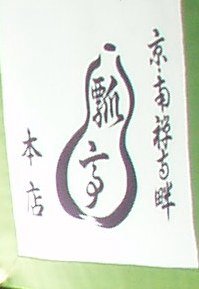
I went to one of the greatest traditional Japanese restaurants in Kyoto, the oldest city in Japan, named "Hyoutei." I'll describe how I ate marvelous dishes.
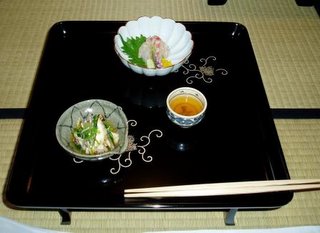
The first dishes were here.
The one over there is raw fish, Tai, one of the valuable fishes in Kyoto, while the one closer to you is a kind of salada with vinegar, full of matsutake, one of the most expensive mushrooms in Japan, cherished for its fragrance.
Well, let me describe what is the most important part in the room. In Japanese tradition, the part below is thought to be the most sacred in the room.
It should be noted that the flowers and the ornament you see in the photo have no relation with any religion. In Japanese tea ceremony, what matters most is tranquilty with which you do everyday-things, like enjoying seeing flowers and reading words, and having meals, and you're expected to do those things very beautifully there. By the time you pass away, you will have taken so many meals; however, you're required to cherish just one meal consisting of several dishes each of which has been elaborately cooked with so much care.
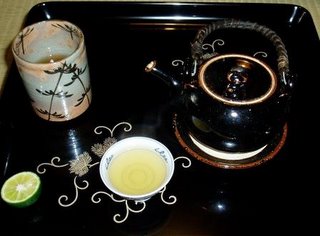 This is "dobin-mushi," which is explained in a book written by an American who is interested in Japanese cuisine, "delicate clear soup made in an individual miniature dobin ... [or] a famous autumn speciality of Kyoto and usually contains matsutake, chicken, mitsuba, and ginnan. The juice of sudachi is squeezed into the dashi, which is drunk from little cups. The other ingredients are fished out chopsticks and eaten. One of the great delicacies of Japan."
This is "dobin-mushi," which is explained in a book written by an American who is interested in Japanese cuisine, "delicate clear soup made in an individual miniature dobin ... [or] a famous autumn speciality of Kyoto and usually contains matsutake, chicken, mitsuba, and ginnan. The juice of sudachi is squeezed into the dashi, which is drunk from little cups. The other ingredients are fished out chopsticks and eaten. One of the great delicacies of Japan."
I ate seven dishes there. A meal, consisting of the seven dishes has been regarded here as the greatest and most gorgeous meal in Japan since the twelfth century. The second greatest meal has five dishes, and the third one three dishes. The photo on the left is one of the seven dishes, which comes third. The hard-boiled egg in this restaurant is well-known for its delicateness. I would recommend you to try this if you had a chance to eat there.
The last dish is the dessert, with which I concluded my special meal in Kyoto, with tea, called "matcha".
10/29/2005
Valuable Mushrooms

In the photo you are seeing the most invalueable mushrooms in Japan, maitake and matsutake, grilled in Japanese paper made from mulberry bark. The former mushroom is famous for its tasting greatest while the latter for its fragrance though non-Japanese may not love them to the extent to which many Japanese cherishe them. Anyway, they are too expensive here!!
9/18/2005
a Japanese Sweet

According to some non-Japanese I have ever met, Japanese desserts are not so sweet, not enough to satisfy them. This should be one of them. The semi-transparent cubes are agars made from kudzu, which in itself doesn't have any taste and needs flavor from the white soybean-flour-and sugar powder and the raw-sugar black syrup.
9/16/2005
Who caused Katrina?
The TV programs and websites has reported how some of Americans blamed President Bush and FEMA for their slow responses and alleged discrimination. But my rough scrutiny of the websites and the blogs conveying the views of some of you on "who is to blame?" has revealed that the damage would have been much smaller if the New Orleans Mayor Nagin, who looks an African American at a first glance, had followed the instructions prescribed in New Orleans Official website, that is currently unavailable unless you are qualified to see it.
I'm confusing and wondering why some of not only Americans but also the world has blamed the President so bitterly. To me, it's like a political teasing, as adopted by some of the persons who belong to minority groups. My study disclosed how the minorities in the US HAVE incurred so much distress, but it seems to me it is not fair. I'm sure that is not the way my American friends will do it.
8/23/2005
complicated
8/11/2005
China, that looks sly to Japan.
Japan has been avoiding exploring such area because it didn't want any trouble with China. Then, China began to do that. In this kind of case, many of Japanese think China should not do that if it doesn't want any trouble with Japan. But I know this kind of thinking looks a little bit abstinent to some of you. Do you think the Chinese move can be OK?
